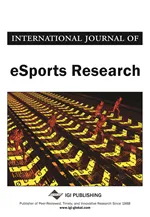
With being named an official sport of ESPN and predictions that viewership will reach up to 46 million by 2023, the world of eSports is quickly expanding and becoming a multi-million-dollar industry. The North American League of Legends Championship Series alone ended up getting more views than the U.S. Super Bowl. Although this industry is rapidly growing in popularity, academicians and institutions are now recognizing this as a viable research area. To discuss this trend, IGI Global recently interviewed Dr. Caroline Crawford, from the University of Houston-Clear Lake, USA, and editor of the Open Access journal, International Journal of eSports Research, on her mission to integrate eSports into mainstream academia along with the inspiration behind starting IJER of her and her co-editor, Dr. Sharon Andrews, from University of Houston-Clear Lake, USA.
What inspired you to pursue research activities in eSports?
 Dr. Caroline Crawford (University of Houston-Clear Lake, USA)
Dr. Caroline Crawford (University of Houston-Clear Lake, USA)What brought me into the world of eSports research was the 2019 Fortnite World Cup event. It was the end of the summer of 2019, and I was hearing more and more about the Fortnite World Cup that had up to $30 million in awards for players. It was not only a brilliant marketing venture for Fortnite, an online “battle royale” video game, but it was the all-encompassing aspect of what went into setting up and running the Fortnite experience on a global scale. Overall, this led to my interest in the business side of eSports. There are innumerable opportunities from an eSports research standpoint, and there was no academic eSports research journal available, with only a few business journals offering articles around gaming.
At that point, I contacted a few faculty colleagues to see what might be going on in their colleges and their interest level towards developing an eSports program of study. My interest was the business side of eSports, but I recognized that others had their own viewpoints and wanted to test the waters around this area of research. There was no academic degree in this area within our university or in any of our colleagues’ universities, both nationally and internationally. We looked further into what type of eSports centers, certifications, programs, and academic venues might already be available in other universities and colleges and found that most universities were looking at eSports as a club. It was not seen as an area of study and there wasn’t any undergraduate/graduate programs to move individuals into an eSports career path with the support of certificates of specialization. Further, there were no academic eSports journals.
From there, I contacted Dr. Sharon Andrews, who is a superior Software Engineering faculty member at the University of Houston, Clear Lake, in Texas, USA, to see what she thought about the idea to develop different degree programs of study and certificates in eSports, as well as places to publish this area of research.
As the program chair and faculty member of a master’s-level Software Engineering program, Dr. Andrews has directed the development of many gaming application projects, ranging from games that simulate space from the point of view of an astronaut, to the development of games that train users on how to participate in a sport, such as the equestrian Olympic sport of dressage. This work led to research projects looking into the world of online competitive gaming, which led Dr. Andrews to her interest in developing a framework for the assessment of the levels of “fiero”, an indication of high emotional response of a user to a game. This “fiero” can account for the game's ability to attract and hold a user’s attention and desire to return to the game to play.
In addition, this focus on “fiero” intersects her research with mine in the areas of developing frameworks and theories for the assessment of user engagement as applied to online competitive gaming. During our initial conversations, we were approached by IGI Global letting us know they were actively looking for journal proposals, making it the perfect timing to start a journal in this area of research.
Why are your respective areas of research important to the field at large?
 Dr. Sharon Andrews (University of Houston-Clear Lake, USA)
Dr. Sharon Andrews (University of Houston-Clear Lake, USA)Both Dr. Andrews and I have a combined set of 40 years of experience dealing with students in online learning environments.
Dr. Andrews holds her doctorate in Computer Science, and has been a faculty member in both Computer Science and Software Engineering. She was the founding designer, developer, and implementer of the 100% online Software Engineering program at our university. Her students are consistently engaged in developing interactive products that engage the end-user, with a focus on understanding software architecture and user experience. Dr. Andrews is naturally aligned with eSports development and associated real-world gaming development. Establishing a repeatable framework for measuring the levels of “fiero” and flow can allow games under development to be assessed on their ability to deeply engage the user. It also has implications for the development of improved andragogical and heutagogical educational materials, methods, and games that depend on positive levels of learner engagement for effective retention and real-world application of learned concepts. Online competitive gaming is one of the newer and upcoming methods that can be utilized within the education spectrum of today's ultra-online-tech-savvy students, and the selection of appropriate methods to various areas of study is increasingly important.
My areas of expertise are around training and talent development, as I have a doctorate in Instructional Design and Learning Technologies, as well as Curriculum Theory. My interest in eSports began due to the eSports events that were clearly immense social and cultural engagements. They brought forward potential differentiated instructional and training experiences towards meeting and enhancing learning objectives for all ages, young children through retired adults, making the possibilities endless.
Yet at the same time, I know of innumerable faculty within my university as well as globally, who were avid gamers and held not only specializations in various areas of expertise, but also understood the nuances around eSports. This creates potential to melding not only the faculty’s academic world of specialization area-based research engagement, but also embedding research bound within the eSports realm. Hospitality, communications, media, marketing, social welfare, sociology, psychology, finance, business administration, computer science, software engineering, graphic design, multimedia arts, music and composing, and related areas of specialization not only work together towards understanding the actual gaming experience of eSports, but also understanding the business side of eSports, which isn’t an area that has been fully realized. We wanted to be on the front end of research and movement, and there is nothing better than a forward-leaning analysis of the landscape and recognizing the immense potentials and possibilities that are just around the corner.
One current example is the COVID-19 pandemic response that is occurring in Pre-K-12 and higher education environments, as well as business and industry. The rapid response towards remote training and instruction is being rethought towards a more sustainable and realistic model, to ensure that there are different forms of instructional engagement in the changing landscape. A recognition of the potential educational and instructional support offered by eSports and differentiated gaming environments is clearly a forthcoming reality.
In your opinion, what are some of the benefits of your research to its community of users?
Gaming and eSports research has been offered in a more haphazard manner up to the introduction of the International Journal of eSports Research. This international double-blind peer reviewed journal offers the opportunity to pull together a focused approach to eSports research. Further, the Associate Editors and Board of Reviewers hold specializations in many fields of expertise, as well as within eSports, reflecting a knowledgeable and supportive environment wherein professionals bring forward their expertise throughout the peer review process.
The most direct benefit of this journal and research is the effect on classes in software engineering and its curriculum, as well as the effects on improving student engagement for online and blended classrooms. These benefits include:
- The progression over the years to our Software Engineering program being nationally ranked for multiple years from 2017-2020.
- The increase in the ability of faculty to engage with students in online and blended classes.
- The increase in the ability to deliver cutting edge projects related to gaming to students who desire to explore such areas.
More recently, these benefits have moved myself and Dr. Andrews to put forward a proposal for new masters, bachelors, and certificate degrees in eSports at our university. These programs can now reach a vast new and important segment of a highly social online group of technology savvy individuals who can seek employment within a vast range of new eSport-related careers.
What are the future directions of your research areas?
The Gaming Engagement Framework we have developed (analyzing and measuring the of levels of “fiero”) sets the groundwork for its expansion into improved testing for eSports through reviewing the weak and strong areas of the games. Through this framework, these tests can include additional methods of collecting physiological and physical measures, correlating existing measures to various categories of games, and re-evaluating these measures in response to additional case studies. Additionally, this framework has resulted in a defining a process that enables a more innovative problem solving method. This method can be used to help teams and organizations inject creativity and innovation into the product development process, making the team innovators, rather than simply coders, an essential and important future direction.
The socialization within eSports environments, the conceptual framework of learning and understanding that occurs within eSports environments, fits well within a multitude of areas of research that has been virtually untapped, leading us to believe that eSports research is wide open and the future direction is not yet fully realized.
What are some other evolving research trends you have observed in your industry/field over the past several months and what would you say are some of the innovative research directions you foresee in the future? How do you feel your publication sets the pace for these innovations?
This new journal is extremely important and cutting edge in that it focuses together under one umbrella the notions of innovative thinking, creating new models of effective user engagement and learning, new methods of game assessment, new uses of games in society, and its implications socially, cognitively, and philosophically. These various and interconnected points reflect directly into our new world of online learning, incorporating and recognizing the importance gaming has played informally to this process and now it must come to the forefront within a journal dedicated to the recognition of the full arrival and acceptance of eSports.
The COVID-19 pandemic took over and totally revamped the Spring 2019 semester in higher education as well as other areas of societal culture, causing everything to be under a state of rethinking and revision. I’m finding that higher education and K-12 faculty and institutions are recognizing that “never online” is no longer an option, with back-up alternatives necessary and appropriate to have in place. For this reason, there is a significant majority of institutions and instructional faculty who have very little or no experience offering instructional support through anything beyond a traditional face-to-face environment. As the traditional educational delivery mode is forcing traditionalists into rethinking modes of instruction, an opportunity to rethink gaming and eSports as a connective activity arises.
This is a brilliant time and opportunity to reconsider the concept of eSports from differentiated models and modes of engagement. Why not implement eSports environments as learning venues? These environments provide a highly charged, highly engaged community-based endeavor wherein gamers work together simultaneously toward an outcome. Might there be parallels between the learning experience and a supportive instructional environment wherein learners and instructional faculty are working together toward achieving and enhancing instructional objectives? This is where Dr. Andrews’ areas of specialization comes to the forefront, as a depth of understanding around creating viable environments in which community building and engagement must occur makes it absolutely vital toward supporting instructional success. With Dr. Andrews’ experience and knowledge base, this can be a successful venture into rethinking, within an instructional venue, what is gaming and what is eSports. Herein is where an initially evolving research trend may be realized. Yet there are innumerable additional areas of specialization that are moving into the realm of eSports, as well as bound within eSports as viable areas of research.
What has your experience been like publishing with IGI Global?
Our experiences in publishing our research and creative works through IGI Global has been outstanding. The proactive support received at every step of the review and publication process has been unlike the support and professionalism that I’ve received through almost every other venue. Further, the respect and support offered around this high-quality, timely publication has been an outstanding experience.
The International Journal of eSports Research is currently available under full gold OA. To view all of the research available under this journal, view the journal webpage. If you are interested in submitting an article for consideration to IJER, view the Call for Papers here or contact Dr. Sharon Andrews at sandrewsijer@gmail.com.
| | Forthcoming Title by Caroline Crawford: | | Shifting to Online Learning Through Faculty Collaborative Support | Prof. Caroline M. Crawford (University of Houston-Clear Lake, USA)
©2021 | 335 pgs. | EISBN: 9781799869467 | - Leading Editor in Instructional Design
- Receive 5% Pre-Publication Discount
- Covers Virtual Collaborations, Course Design,
& Digital Leadership
|
| |
|
|
For your reference, find below a sample of related titles covering eSports, gaming, business, and culture below:
Disclaimer: The opinions expressed in this article are the author’s own and do not reflect the views of IGI Global.
About IGI Global: Founded in 1988, IGI Global, an international academic publisher, is committed to producing the highest quality research (as an active full member of the Committee on Publication Ethics “COPE”) and ensuring the timely dissemination of innovative research findings through an expeditious and technologically advanced publishing processes. Through their commitment to supporting the research community ahead of profitability, and taking a chance on virtually untapped topic coverage, IGI Global has been able to collaborate with over 100,000+ researchers from some of the most prominent research institutions around the world to publish the most emerging, peer-reviewed research across 350+ topics in 11 subject areas including business, computer science, education, engineering, social sciences, and more. To learn more about IGI Global, click here.
Newsroom Contact
Caroline Campbell
Marketing Manager
ccampbell@igi-global.com
(717) 533-8845, ext. 144
www.igi-global.com/
*E-journals are hosted on IGI Global’s InfoSci® platform and available for PDF and/or ePUB download on a perpetual or subscription basis. This discount cannot be combined with any other discount or promotional offer. Offer expires December 31, 2020.